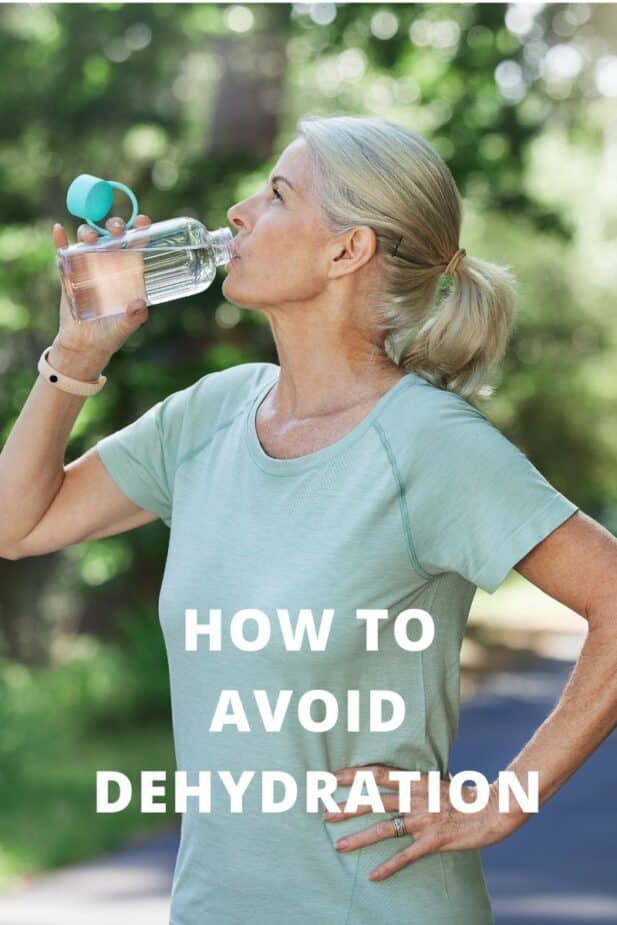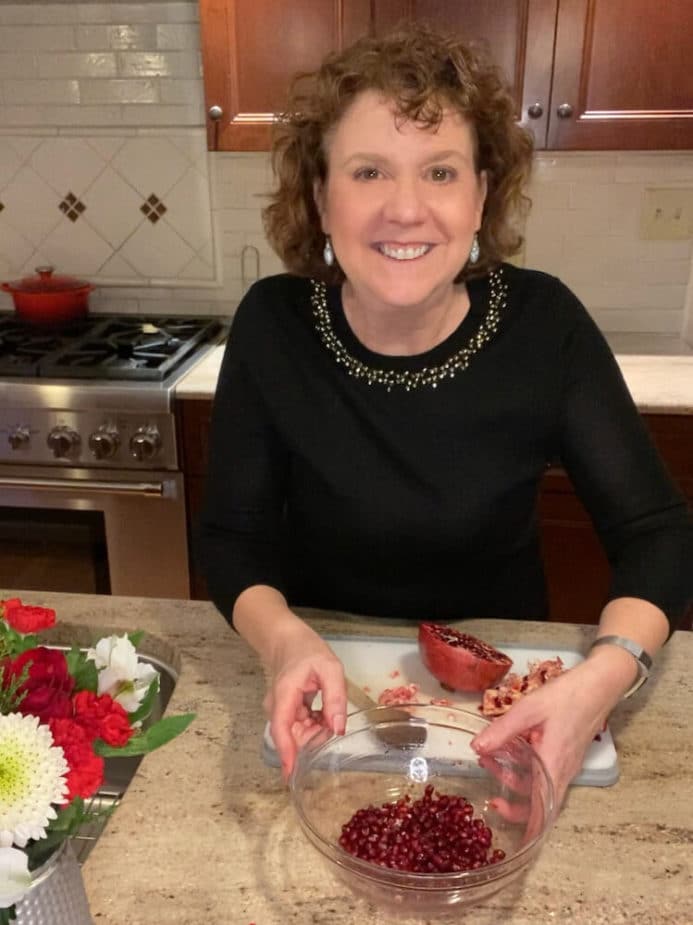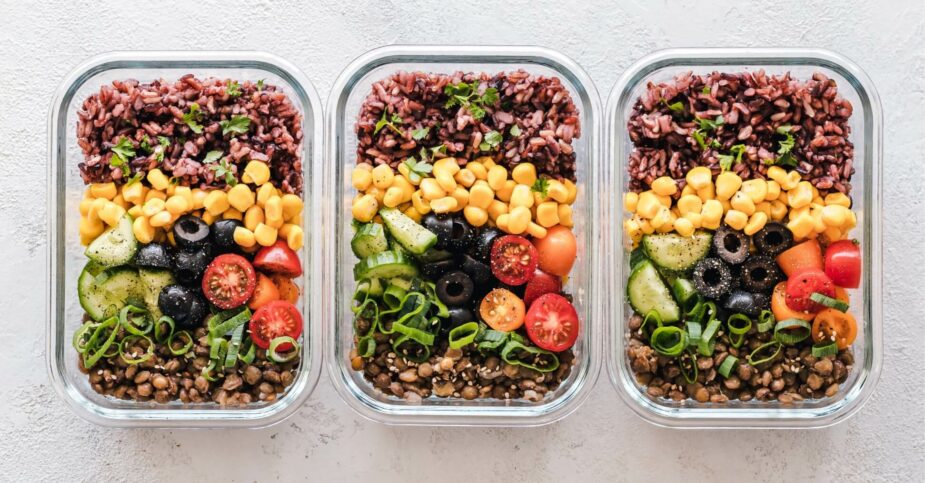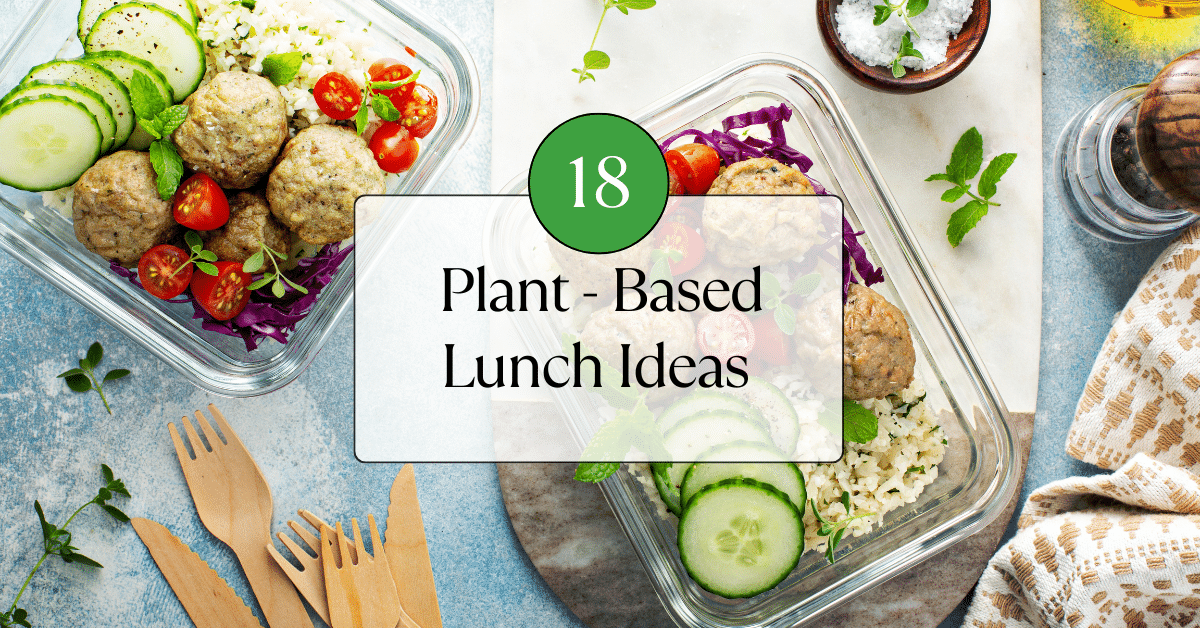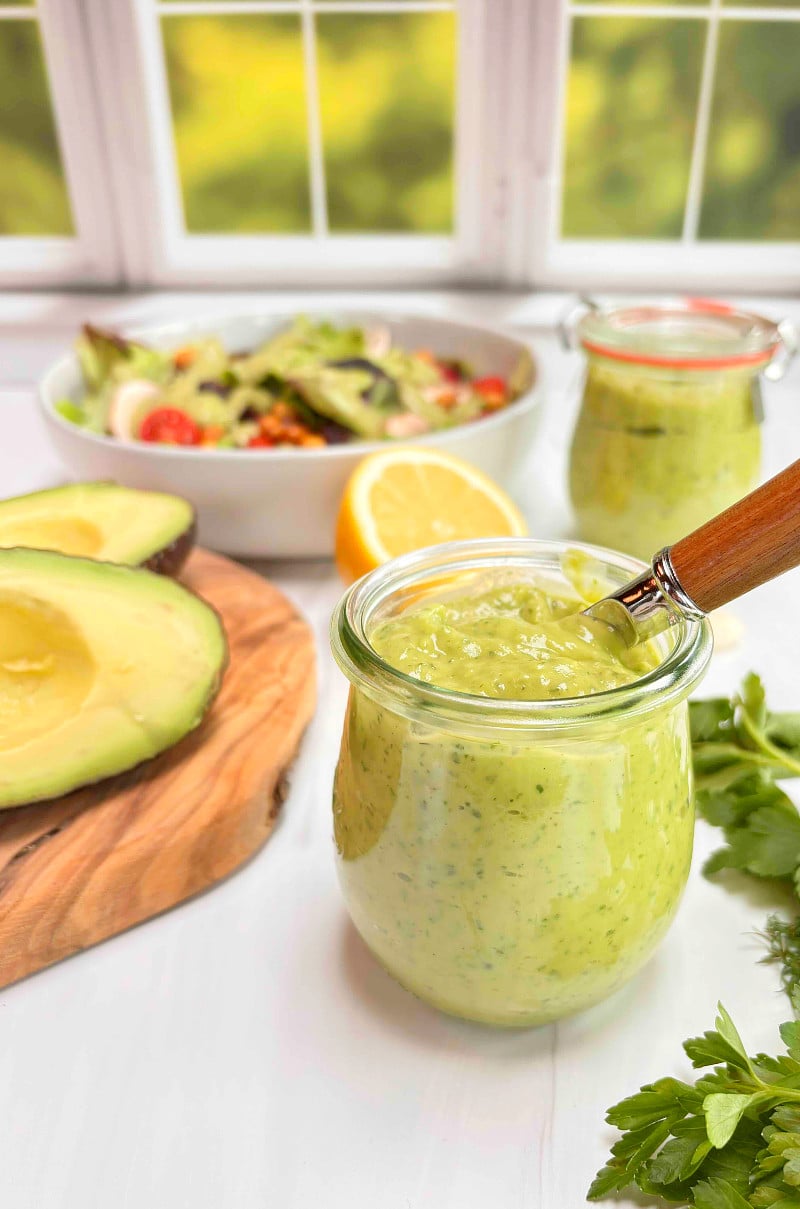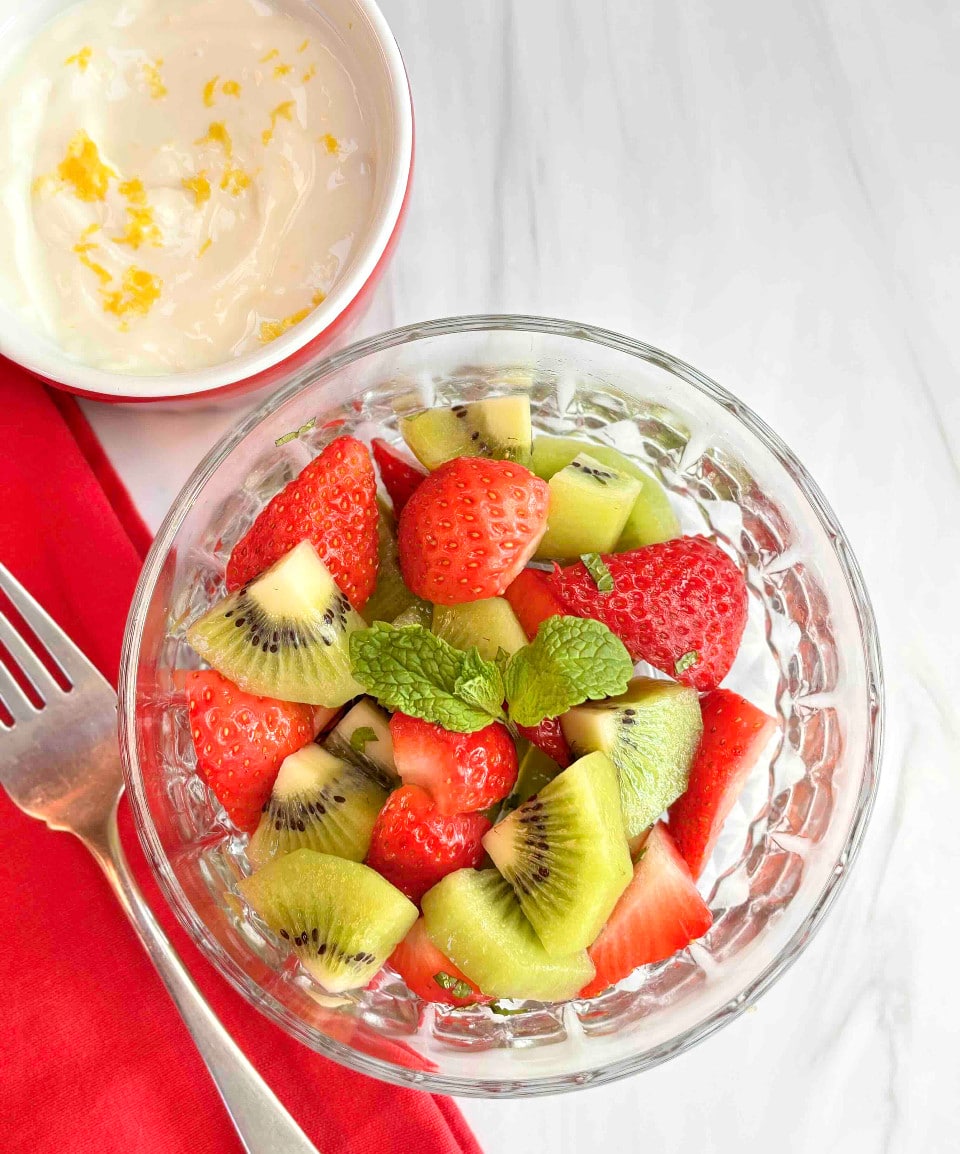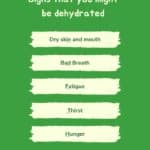You know you need to focus on getting more fluid when it’s hot outside or when you’ve been exercising a lot, but did you know this is something you should prioritize every day? Being even slightly dehydrated can lead to a variety of health issues. But how do you avoid dehydration?
And are you supposed to only drink plain water? I know – plain water, ugh!
How much is enough? Do I really need to drink 8 glasses a day? As my husband says – I’ll float away!
Even though I’m a registered dietitian nutritionist, this doesn’t come naturally to me. I know how hard it is, but I also know how vital it is to maintain my health and well-being!
Let’s simplify this a bit, shall we? In this blog post, you and I will take a quick look at why staying hydrated is so important and how much water you should drink (and foods and other fluids that count). Then, we’ll wrap up with some practical tips to avoid dehydration without “floating away.”
Please note: This post contains affiliate links. As an Amazon Associate, I earn from qualifying purchases.
Why is being hydrated good for your health?
Our body is between 55% and 60% water, and it plays a critical role throughout our body.
- It transports nutrients throughout our body and brain,
- lubricates our joints,
- regulates our body temperature,
- provides structure to our cells and other membranes,
- may help with managing our weight,
- supports our brain’s function.
Being even slightly dehydrated can cause your brain to sloooowwww down. Dehydration can interfere with your digestion, cause your skin to dry out, and may even lead to or exacerbate feelings of anxiety and depression.
To complicate matters, as we get older, we may not notice some of the earliest signs of dehydration as quickly as we do when we are younger. Our thirst mechanism isn’t as tuned in as it was when we were younger, so we may not feel thirsty as soon as we normally would.
And busy lives can also get in the way.
Tips for Avoiding Dehydration
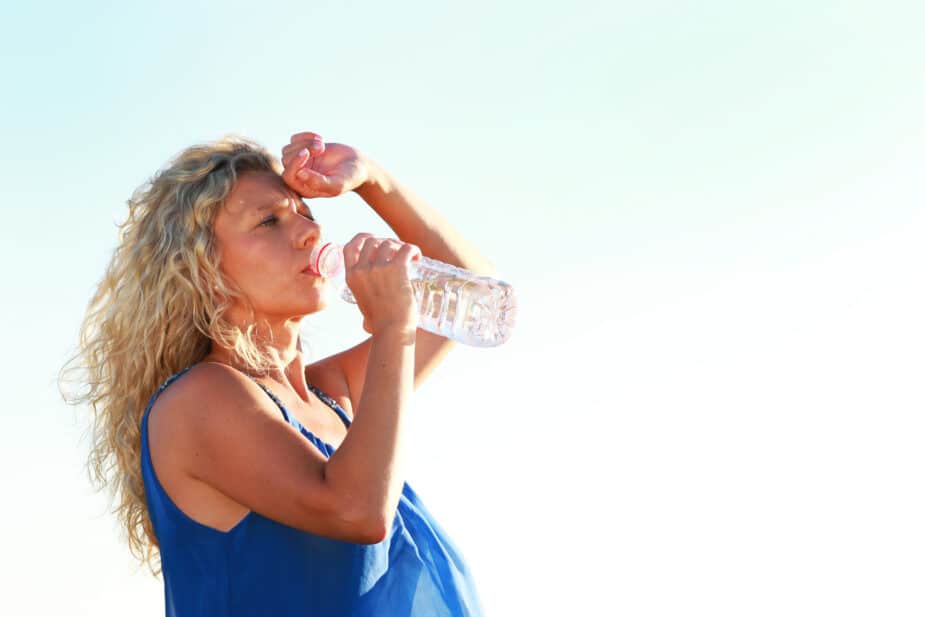
Dehydration can sneak up on you, so it’s best to work on avoiding it. The best way to do this is by eating a balanced diet. That includes eating plenty of fruits and vegetables and dairy products. It also includes drinking water and other non- or low-calorie beverages throughout the day.
- Start your morning off by drinking a glass of water before your breakfast. I sip on one as I’m getting ready in the morning.
- Keep a glass or reusable water container next to you as you work and beside your bed at night. I love the Contigo brand! (affiliate link) They keep the water nice and cold for 8 hours or more, plus they don’t leak and fit perfectly in the drink holder in my car. (I have the pretty passion fruit color – but they are available in at least 12 different colors!)
- Use a straw – we tend to drink more with straws!
- Top your yogurt with berries, or whip up a delicious smoothie for breakfast.
- Toss some cut-up melon into salads, or make a fruit salad as a lunch or dinner side.
- Serve water or milk with all your meals, and make it a point to empty that glass!
- If you don’t like plain water, add slices of fruit to it.
- Freeze mint, berries, and lemon slices in ice cubes and add those to your water
- Try calorie-free seltzer waters if you don’t like plain water. I’m partial to the Bubly, Spindrift, and LaCroix brands. My only caution with these is if you have Gastroesophageal Reflux Disease (GERD), all those bubbles from the carbonation can increase symptoms when drinking these.
- Likewise, if you have dental issues, especially dental erosion, these drinks can lower your mouth’s pH and exacerbate the issue. Limit your intake to just one a day and try to eat something with it. Food will help increase salivation, which will counteract the acid.
How Much Water Should You Drink?
So what about that old rule of thumb that says you need to drink 8, 8 oz. glasses of water a day?
It’s just a rule of thumb. In actuality, the amount we need daily varies by person. Women need less than men and our weight, activity level, and even the climate we live in can increase or decrease it.
The official recommendation from the National Academy of Sciences is that women need about 90 ounces a day, and men need about 120 ounces. But these are general guidelines and it’s better to estimate it based on your weight and activity level.
- Divide your weight in pounds in half. (A 140-pound woman should aim for 70 ounces a day.)
- Plus, for every 30 minutes of exercise, add 12 ounces of water.
BUT…this is a general guide. If you are very active, training or competing in long-distance activities, working outside in hot weather, having a fever or upset stomach, or feeling thirsty, you need to drink more.
Signs of Dehydration
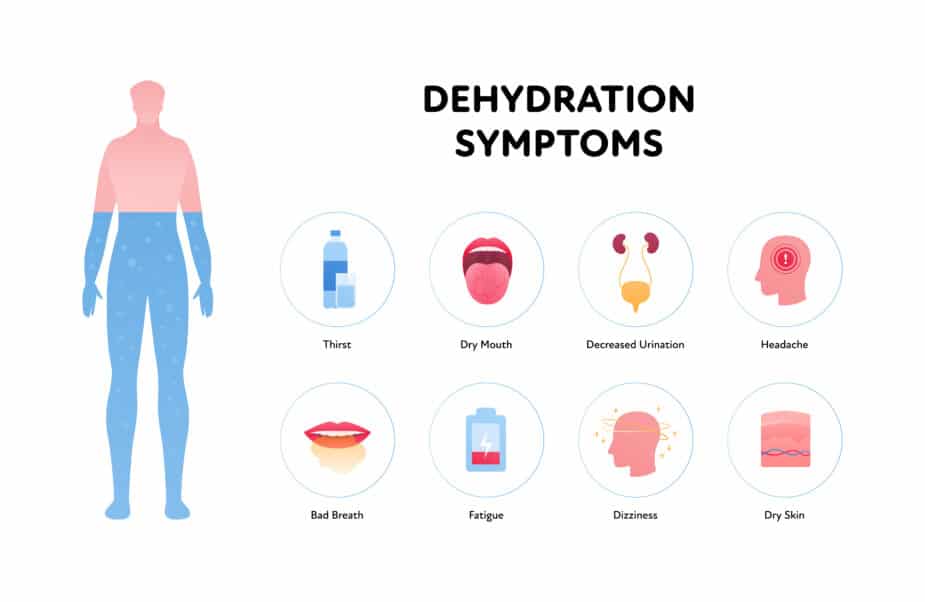
Have you ever heard someone say, “If you are thirsty, you are already dehydrated”? That is true. It is one of the first signs of being dehydrated. However, as we get older, our feelings of thirst aren’t as strong. So, by the time you feel thirsty, you are already down the path toward being dehydrated.
To complicate matters, some common medications may increase our risk of becoming dehydrated. They can pull water from our bodies and cause us to have to go to the bathroom more often or may lead to an upset stomach or diarrhea.
There are other symptoms you can watch out for, such as signs of being dehydrated or approaching dehydration.
These are some common signs that you might be mildly dehydrated and should reach for a glass of water:
- Feeling thirsty
- Dry mouth and tongue
- Bad breath
- Not peeing as often as normal
- Your urine is a deep yellow color (it should be very light – almost clear)
- Headache
- Muscle cramps
- Constipation
- Not sweating
- Lack of energy
- Difficulty focusing
- Hunger – especially sugar cravings
Note: If you feel dizzy, notice a rapid heartbeat and start breathing rapidly, have a fever and chills, become confused and irritable, or faint, these are signs of severe dehydration, and you should seek medical attention immediately.
What are Some Hydrating Foods and Beverages?
You don’t have to drink pure water all day to get enough fluid in. Honestly, 70 ounces (almost 9 cups!) of water daily makes my head spin too. The good news is that a variety of fluids and foods contain water and will help you stay hydrated.
| Food/Beverage | Types | Percent Water |
| Melons | watermelon, cantaloupe, honeydew, and other fancy melons | 90 – 92% |
| Berries | Strawberries, blackberries, raspberries | Strawberries- 91%Blackberries – 85%Raspberries – 88% |
| Citrus Fruits | Oranges, grapefruit, lemons, limes | Grapefruit – 88%Orange – 86%Lemon – 92%Lime – 88% |
| Stone Fruit | Peaches, nectarines, apricots, plums | Peach – 88%Nectarine – 89%Apricot – 86%Plum – 87% |
| Tropical Fruit | Pineapple, mango, papaya | Pineapple – 80 – 85%Mango – 81%Papaya – 89%Kiwi – 90% |
| Lettuce | Watercress, romaine, iceberg | Watercress – 95%Romaine – 94%Iceberg – 96%Leaf lettuce – 95% |
| Cucumbers | Regular, English, Persian | 96% |
| Tomatoes | Regular, cherry, grape | 95% |
| Celery | 95% | |
| Squash | Zucchini and Summer Squash | 95% |
| Dairy | Milk, Kefir, Yogurt | Milk – 87%Yogurt (plain) – 88% |
| Soups | Broth and broth-based soups | Broth – 95%Soups – 80 – 95% |
| Popsicles | 95 – 100% | |
| Coffee and Tea | Regular coffee or tea – 99%*Decaf – 99% | |
| Juice and Juice Drinks | Lemonade, limeade, orange juice, apple juice, grape juice | Lemonade – at least 80% Orange Juice – 90%Apple Juice – 99% |
| Sports Drinks | About 90% |
Frequently Asked Questions
Do caffeinated drinks count as fluid?
While you have likely heard that regular coffee and tea are diuretics (meaning they make you pee!) they are still very hydrating and should/can be counted toward your fluid intake. A rule of thumb is for every 8 oz cup of regular coffee, count 7 oz of fluid.
Can sports drinks help you avoid dehydration?
Sports drinks can be helpful to replenish electrolytes after heavy, prolonged exercise but aren’t necessary for regular hydration. They can contain a fair amount of sugar, adding to your calorie intake.
Is alcohol dehydrating?
Yes! Alcohol is a diuretic which means it increases the amount of water your kidneys remove. It also suppresses a hormone called vasopressin, which tells your kidneys to hold on to water. Without this hormone, your kidneys work harder to get rid of fluid.
Hydrating Recipes!
And, because I always have recipes to share, here are a few using some of my favorite hydrating foods!
Check out my article “Fun Summer Drinks to Stay Hydrated All Summer Long” for more tips and tricks!
That’s a Wrap
Whether it is 90 degrees out or 40, staying hydrated is essential for maintaining our health and well-being, particularly as we age. Stay attuned to the signs of dehydration, and try some of these practical tips to ensure adequate fluid intake.
Remember to drink the recommended amount of water daily, incorporate hydrating foods and fluids into your diet, and listen to your body’s signals. Prioritizing hydration is an important step towards a healthier, more energized you.
Are you looking for more tips and ideas for living a more vibrant and active life? Join my community, and I’ll share a 7-day MIND Diet Meal plan complete with recipes and a shopping list to kick-start your way to a happy, healthy, and energetic life. And yes, the plan includes a few drinks! 🙂

